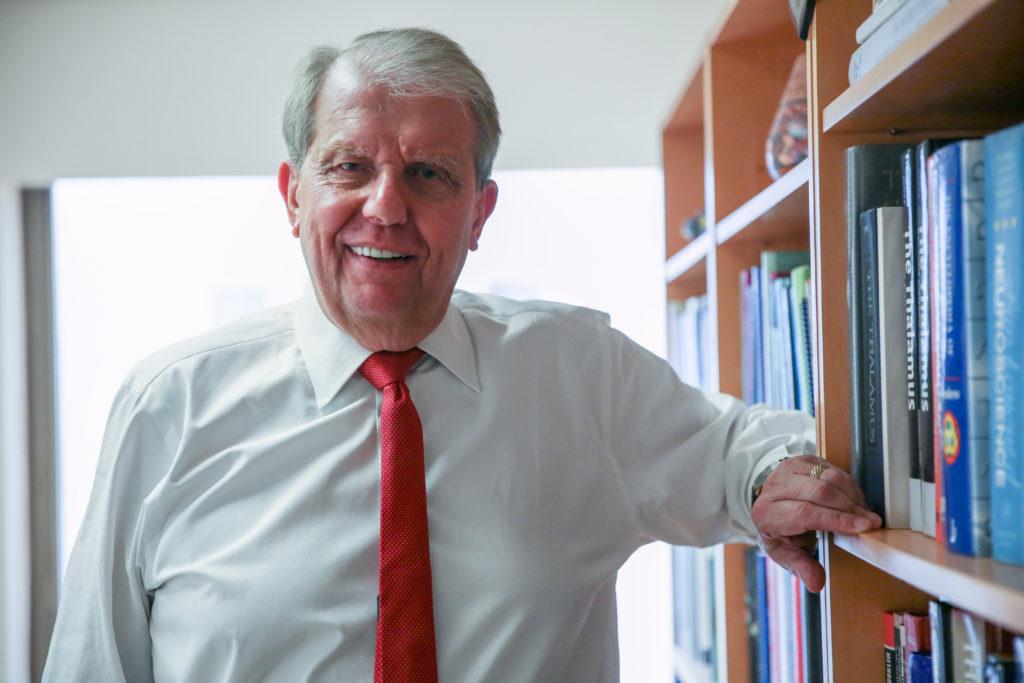As federal research dollars grow increasingly competitive, officials are turning to a new funding source for projects: corporations.
Leo Chalupa, the vice president for research, said expanding agreements between professors and corporations to fund research is one of the office’s central goals this academic year. Chalupa said these agreements show the University’s rising prominence as a major research player, and experts said they often bankroll extensive research projects that require more money and resources than a single university can provide.
“As you get more and more prominence in research – that you’re now a top place to be – then you start getting the interest of corporations,” Chalupa said. “I think corporations are going to be increasing as our visibility as a University increases.”
Chalupa said corporate funding for GW projects has grown in recent years. The University has inked $7.5 million in corporate research agreements so far this year, he said.
The University has received several major corporate research grants over the last few years. In September, an engineering professor secured a $5.3 million deal with U.S. Patent Innovations, a Maryland-based patent company, to explore a plasma-based cancer treatment, a deal officials heralded as the largest corporate research funding agreement in University history.
“We want high-quality, ethical, rigorous research, but without money, research to improve health outcomes can’t happen.”
The drive for corporate funding comes amid a University-wide push to raise its research reputation across fields. During his tenure, former University President Steven Knapp helped the University attract more federal funding for faculty-led projects.
Chalupa said while corporate deals help accelerate projects, officials often have to “protect” researchers from entering a contract that exploits the faculty member to turn a profit for the company.
He said extensive contracts are reviewed by the University’s lawyers to ensure they explicitly outline the relationship between the professor and the corporation. The agreements should be designed to create a partnership where the researcher benefits from monetary aid and the corporation is given expertise from the researcher to develop a product or service, he said.
“Sometimes faculty members just say, ‘I want to get this money, I don’t care about anything else,’” Chalupa said. “But if it’s going to be a disadvantage to that faculty member two or three years down the line, we want to make sure that faculty member knows exactly what he or she is getting into.”
Chalupa said initial concerns about the impact President Donald Trump’s administration would have on research have so far not come to fruition. Congress approved an increase in the budget for the National Institutes of Health in September, a major source of federal funding for research.
Still, federal funding has grown more competitive in recent years with more researchers vying for federal support for projects. Chalupa said GW’s research office has found ways around those challenges – including with corporate agreements.
In 2015, Chalupa said his office would focus more heavily on helping professors and researchers earn funding from international resources. In 2014, Chalupa embedded research staffers in individual schools with the goal of attracting more grants.
In February, officials announced that federal research subsidies to GW had grown $10 million over the last decade.
Michael Keidar, a professor of mechanical and aerospace who is heading up the project on plasma-based cancer treatment, said the funding has given him a partner in the private sector to use the treatment once it’s available for patient use.
“You still can have some freedom and develop the project to the level that you can make discoveries,” Keidar said. “I think this is an ideal mode of collaboration with industry where there is leverage with industry.”
The growing competition for research funding has made these types of agreements more important, but Keidar said the partnerships between academia and the private sector can also improve the quality of projects.
“On one hand, it’s obviously a problem because we prevent more faculty from being able to do research,” Keidar said. “On the other hand, the best proposals win so it’s actually good in a sense that increased competition can lead to better research. But obviously when it gets to such a low level of acceptance, it became very difficult for faculty to compete.”
Researchers said while getting corporate research grants is a competitive process, they are still a vital means of funding larger, collaborative projects with other faculty and students.
“We as academics always find a way to keep going in the field. We are innovative and creative about potential funding sources.”
Experts said while researchers may be concerned that corporations could inhibit creativity, they still allow flexibility in designing projects.
Greg Guilcher, a hematologist at the University of Calgary and researcher for a sickle cell project at Children’s National, said corporations typically provide more funds than universities and nonprofits, allowing researchers access to more advanced and updated resources.
“We want high-quality, ethical, rigorous research, but without money, research to improve health outcomes can’t happen,” Guilcher said.
Elizabeth Aparicio, an assistant professor of behavioral and community health at the University of Maryland, said corporate funding allows researchers to hire more people to assist in analyzing and investigating a study, making the outcome more accurate and reputable.
“We as academics always find a way to keep going in the field,” Aparicio said. “We are innovative and creative about potential funding sources. We do what we need to do to move the field ahead. It’s a time for creativity.”





